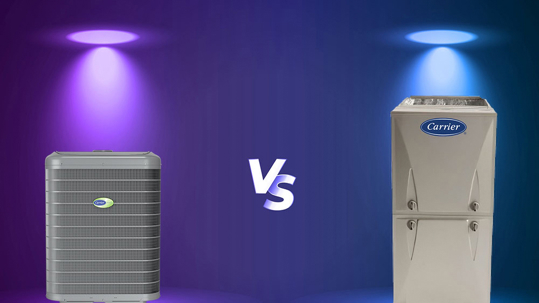How Heat Pumps Work
Heat pumps operate by transferring heat from one area to another rather than generating heat through combustion. During colder months, they extract warmth from the outside air—even when temperatures drop—and distribute it throughout your home. In warmer seasons, they reverse the process to act as an air conditioner. This dual functionality can lead to significant energy savings and lower operating costs.
A major benefit of heat pumps is their efficiency. Because they move heat rather than create it, they can often deliver up to three times more energy than they consume.
Understanding Gas Furnaces
Gas furnaces have long been a reliable heating option for many homeowners. They work by burning natural gas to produce heat, which is then distributed through your home's ductwork. One of the main advantages of gas furnaces is their ability to quickly produce high heat levels during the coldest months.
However, gas furnaces tend to be less efficient than heat pumps, especially in milder climates. Their reliance on combustion also means that they require regular maintenance to ensure safety and efficiency.
Efficiency Comparison: Heat Pump vs. Gas Furnace
When comparing the energy efficiency of heat pumps and gas furnaces, several factors come into play:
- Energy Consumption: Heat pumps typically offer higher efficiency ratings because they transfer existing heat rather than generate it. In contrast, gas furnaces convert fuel into heat, which can result in energy losses during the process.
- Operational Costs: Although the initial investment in a heat pump might be higher, the long-term savings on utility bills can make up for it. Gas furnaces may have lower upfront costs, but fluctuating fuel prices can lead to increased operating expenses over time.
- Environmental Impact: Heat pumps produce fewer emissions since they rely on electricity and do not involve combustion. Gas furnaces, however, emit carbon dioxide and other pollutants, contributing to a larger environmental footprint.
- Climate Considerations: In regions with moderate winters, heat pumps can outperform gas furnaces in efficiency. However, in extremely cold climates, gas furnaces may be more effective at maintaining warmth, even though they are less energy-efficient overall.

This comparison illustrates that the best choice depends on your local climate, energy prices, and personal preferences.
Factors to Consider in Your Decision
Beyond efficiency, several other factors should influence your decision between a heat pump and a gas furnace:
Installation Costs: Heat pumps often require a more complex installation, especially if your home isn’t already set up for ducted systems. Gas furnaces, in many cases, are easier and less expensive to install.
Maintenance Needs: Regular maintenance is crucial for both systems. Heat pumps need routine checks to ensure optimal performance, while gas furnaces require inspections to prevent safety hazards like gas leaks.
Home Comfort: Consider how each system distributes heat. Heat pumps provide even, consistent heating and cooling, whereas gas furnaces can create quicker bursts of heat that might lead to temperature fluctuations in some homes.
Taking these factors into account can help you choose the system that best meets your home's needs and your budget.
Making the Right Choice for Your Home
Deciding between a heat pump and a gas furnace is not always straightforward. It requires balancing upfront costs, long-term energy savings, and environmental considerations. Many homeowners in Eugene find that a heat pump offers a compelling combination of efficiency and versatility—especially in a climate where temperatures can vary widely throughout the year.
On the other hand, if you live in an area where extreme cold is the norm, a gas furnace might still be the most practical solution despite its higher operational costs. Evaluating factors such as your local energy prices, installation logistics, and personal comfort preferences is key to making the right choice.
For those who remain uncertain, consulting with a professional HVAC technician can provide personalized advice tailored to your specific situation.
Ready for a Smarter Heating Choice?
Transform your home’s comfort and efficiency by choosing the system that best meets your needs. Experience the benefits of a heat pump/furnace combo system with our Eugene expert HVAC services. Contact us today to schedule a consultation and take the next step toward a more energy-efficient home.

